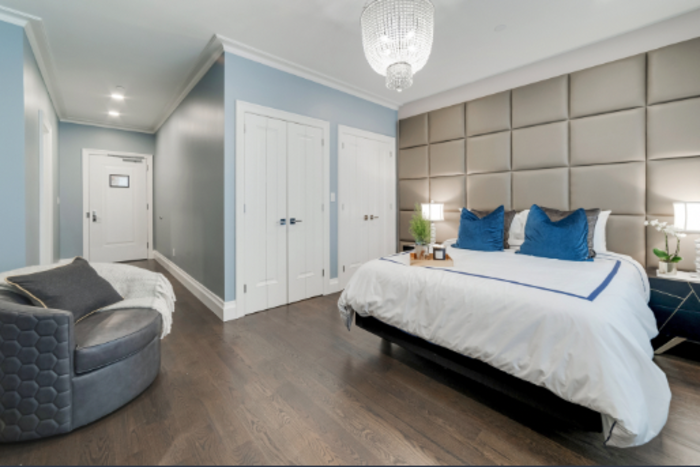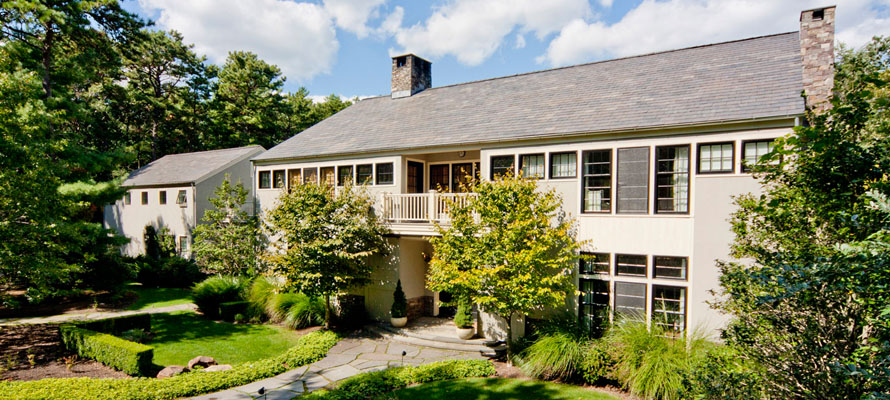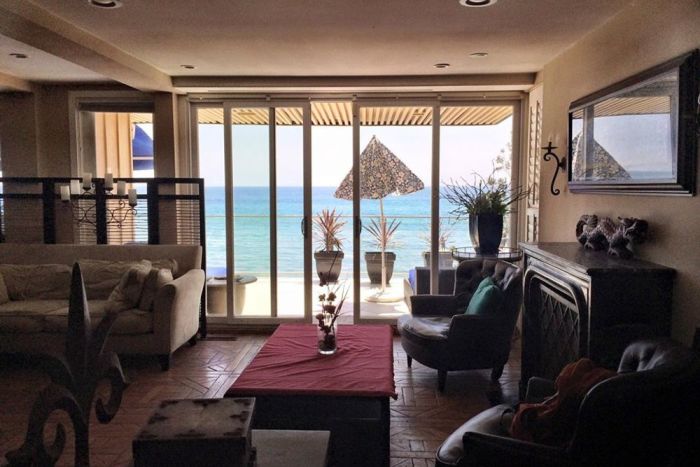New Yorkers’ lifestyles are as varied as the rich tapestry of people that define the state—and luxury rehabs here build their programs around this. You’ll find programs with flexible lengths of stay, amenities for busy professionals, and specialized treatments for specific client groups.
Whether you prefer the convenience of an urban setting, the quaintness of a mountain town, or the peacefulness of the seaside, New York rehabs have something for everyone and high-level care to boot.
Serenity in the City
If you live in New York City and don’t want to travel for treatment, several rehabs in the city provide ways to find calm while staying close to home.
Urban Recovery
Urban Recovery offers medically supervised detox followed by an intensive treatment program that includes 35 clinical hours per week. Their 5-story building on the waterfront in Red Hook boasts views of the New York Bay from the rooftop lounge. Residential treatment here can be short- or long-term, with detox programs lasting 5-10 days, residential stays up to 30 days, and intensive outpatient programs up to 90 days. Clients attend yoga and pilates classes with professional instructors and enjoy facilities like the fitness room, music studio, and art room while they heal.

Ascendant NY
Housed in a Manhattan brownstone, Ascendant NY offers a private space with a focus on confidentiality. Programming here prioritizes the detox process, providing nutritious meals, yoga, and fitness to ease the effects of withdrawals.
Hazelden Betty Ford New York
Conveniently located on Manhattan’s West Side and backed by Betty Ford’s long-standing reputation, Hazelden Betty Ford New York offers a range of addiction treatment programs tailored to various needs. These include outpatient programs, virtual therapy, lower-intensity options, and recovery management.

Clients here also get to meet the center’s resident labradoodle and certified therapy dog, Bear, who rides the subway to work each day to provide residents with a dose of nonjudgmental comfort.
See our list of luxury rehabs in New York City for information on additional programs.
Upstate Escapes
If you’re looking to connect with nature as you heal, rehabs upstate offer even more quietude. Not far from the city are the winding rivers, staggering mountain peaks, and seemingly endless seas of trees that make Upstate New York feel like a world away.
Mountainside Retreats
New York State’s 4-seasons climate means its countryside is bright green in the summer, but transitions to vibrant oranges, reds, and yellows in the fall. Snow blankets the state in the winter, while blossoms burst with color in the spring.
Mountainside Chappaqua, for example, is only an hour away. But the complete change of scenery might lead you to believe otherwise. Chappaqua is a hamlet (tiny village) of just under 3,000 people. Here, you can immerse yourself in nature’s sanctuary on meditative hikes near the property.
You’ll find Saint Jude Retreats in the small town of Amsterdam. This secluded property rests on acres of forests and meadows. You can walk their private trails or fish for bass in the pond—and in the winter, the water freezes, setting the stage for outdoor ice skating.
Activities in the natural world don’t end on their own property, though. Every other week, clients visit the Adirondack Mountains for outdoor excursions like hiking, horseback riding, and cross-country skiing.
Coastal Refuge
If the sounds of ocean waves are calling you, The Dunes of East Hampton is just under 2 hours from NYC. Located inside a private gate and secluded woodland, this facility is only steps from the seaside. You can walk to the beach for picturesque views of Long Island coastal bluffs and rolling fields. Staff here also take clients on outdoor excursions like sailing, nature walks, and biking along scenic pathways.

Spending time outside is more than just a fun pastime—it’s also good for your mental health and well-being. One study found that spending just 2 hours per week in nature positively affects your health. According to psychological scientist Amanda L. Mahaffey, “A vast body of research shows us that, above all, humans flourish in nature. Pretty much everything about nature has a positive effect on us in some form.” And this includes your recovery journey.
Programs for Executives and High-Profile Clients
Clients under extra pressure to perform face unique challenges in recovery. In fact, some people believe that risk factors associated with these lifestyles mean people in high-powered positions may be more prone to addiction.
K.L., a client at The Dunes of East Hampton, describes his struggle with substance abuse despite his polished image:
“I am a professional with a high level of education, although I had been struggling with alcoholism and addiction for over 20 years. I was a patient at over 10 facilities in the past 10 years, with no improvement. Everyone in my life had given up on me, including myself. People who knew me thought, ‘He is highly educated and professional, why can’t he just stop?!’”
K.L. determined the causes of his addiction with the help of a team of specialists. For him, that included a past trauma, a family history of alcoholism, and underlying mental health issues. In recovery, K.L. worked through those issues, and began to heal from the inside out.
Fortunately, some rehabs have specific programs for professionals like K.L. who need more flexibility in their care.
How NY Rehabs Cater to High-Profile Clients
Some people aren’t able to step away from their job for the duration of residential rehab. And that’s understandable—most programs are at least 28 days, and if you have people depending on you, it’s hard to stop work entirely. Or, you might be a celebrity seeking solitude and anonymity. Whatever your background, some luxury rehab centers make an extra effort to accommodate executives, celebrities, and other high-profile clientele.
These might include special resources for professionals, like those at The Dunes of East Hampton:
- flexible technology policies that allow clients to use their cell phones and laptops for work
- separate meeting rooms to give clients privacy while they work for enhanced focus
- the ability to create your own schedule so you can go to therapy around work meetings
- a sober companion who can accompany you to work-related events and activities, during and after rehab
- private living quarters and secluded facilities that shield you from the outside world
- comforts like massage, gourmet meals, swimming pools, and more
These services help clients have the most comfortable rehab experience possible—while keeping an eye on their responsibilities.
Treatment for Eating Disorders and Other Dual Diagnoses
Eating disorders include anorexia nervosa, bulimia nervosa, and binge eating disorder (BED). While the symptoms in each condition differ, the core is the same: an unhealthy relationship with food.
Eating disorders often occur along with substance use disorders,1 especially in adolescence. Women make up 90% of eating disorder patients, and 50% also misuse substances. There’s a good chance that another co-occurring condition is present too, like anxiety, major depressive disorder, or PTSD.
Because this is so common, some rehabs specialize in treating eating disorders, addictions, and other mental health conditions all at once. Clementine Briarcliff Manor treats girls ages 12-17. (Adolescent girls are more likely to develop an eating disorder.) Treatment includes exposure therapy alongside traditional talk therapy. In exposure therapy, clients work through uncomfortable situations in a safe, supportive environment. In this context, clients might practice food shopping or creating a nutritious recipe. Sometimes these exercises involve family members. They might even include exposure to activities at home or school to prepare you for situations you may encounter in real life.

Although more common in women, eating disorders—like substance abuse—can affect anyone. Other rehabs cater to specific groups, like Center for Discovery Hamptons for adolescents of all genders, and Monte Nido River Towns for adults.
Recovery Coaches
Mountainside Chelsea has a unique program in which each client is assigned a recovery coach. According to their team, “Mountainside Recovery Coaches are certified professionals that act as partners, allies, mentors, and advocates for clients in early recovery.” These coaches can help clients apply for jobs, find housing, and build support networks. They can help you complete goal-setting exercises, create a sustainable routine, and discover new hobbies. Recovery coaches are available to take calls 24/7, whether you’re having a hard day or want to share good news. Many of these coaches are in recovery themselves, and can directly relate to your ups and downs.
A recovery coach at Mountainside Chelsea describes his goal this way:
“Our job as a coach is to help clients get comfortable with being uncomfortable, so they can later do those things on their own.”
Weaving Culture Into Care
In addition to this special program, Mountainside Chelsea immerses clients in the thriving culture of New York City. Clients can go to museums, shows, amusement parks, cooking classes, and more. Remember that recovery can be fun—and in fact, parts of it should be. It’s important to balance out the emotionally exhausting parts of this work with rewarding activities. Having fun is crucial to a self-care routine, and can even prevent relapse. And in New York, this means exploring the life-affirming experiences that the city has to offer.

A Fresh Start Is a Phone Call Away
New York has plenty of quality care options for those living in the state and traveling from elsewhere. Whether you’re looking for treatment in the heart of the city or the spaciousness of the countryside, New York may just have an option for you.
Search our collection of luxury rehabs in New York to see photos, take virtual tours, read reviews, and more.



